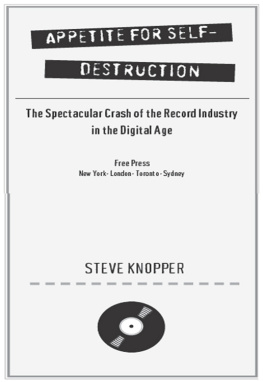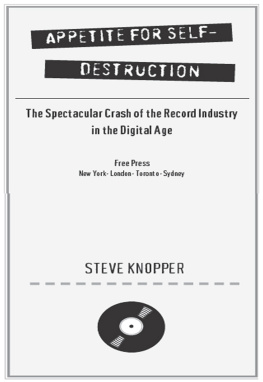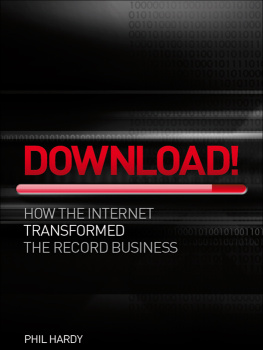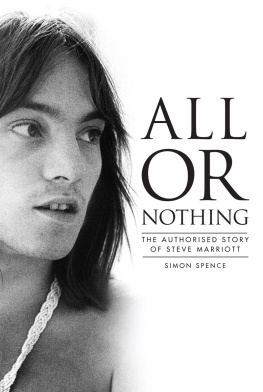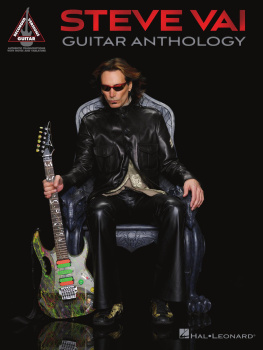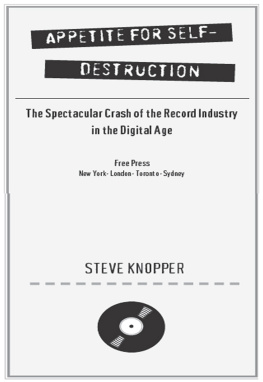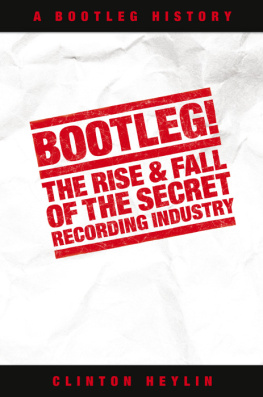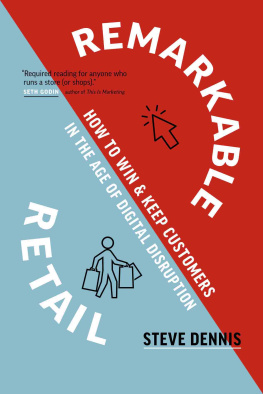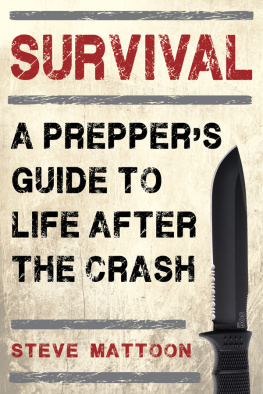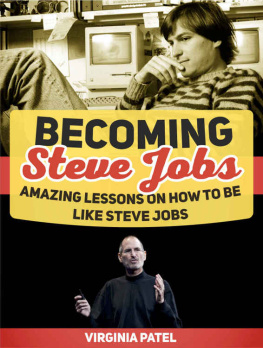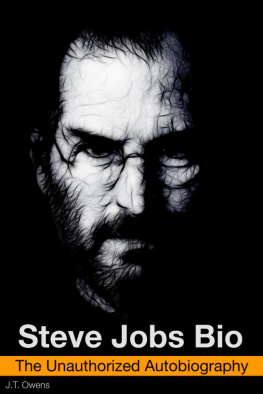Steve Knopper - Appetite for Self-Destruction: The Spectacular Crash of the Record Industry in the Digital Age
Here you can read online Steve Knopper - Appetite for Self-Destruction: The Spectacular Crash of the Record Industry in the Digital Age full text of the book (entire story) in english for free. Download pdf and epub, get meaning, cover and reviews about this ebook. year: 2009, publisher: Simon & Schuster Adult Publishing, genre: Non-fiction. Description of the work, (preface) as well as reviews are available. Best literature library LitArk.com created for fans of good reading and offers a wide selection of genres:
Romance novel
Science fiction
Adventure
Detective
Science
History
Home and family
Prose
Art
Politics
Computer
Non-fiction
Religion
Business
Children
Humor
Choose a favorite category and find really read worthwhile books. Enjoy immersion in the world of imagination, feel the emotions of the characters or learn something new for yourself, make an fascinating discovery.
- Book:Appetite for Self-Destruction: The Spectacular Crash of the Record Industry in the Digital Age
- Author:
- Publisher:Simon & Schuster Adult Publishing
- Genre:
- Year:2009
- Rating:5 / 5
- Favourites:Add to favourites
- Your mark:
- 100
- 1
- 2
- 3
- 4
- 5
Appetite for Self-Destruction: The Spectacular Crash of the Record Industry in the Digital Age : summary, description and annotation
We offer to read an annotation, description, summary or preface (depends on what the author of the book "Appetite for Self-Destruction: The Spectacular Crash of the Record Industry in the Digital Age " wrote himself). If you haven't found the necessary information about the book — write in the comments, we will try to find it.
Appetite for Self-Destruction: The Spectacular Crash of the Record Industry in the Digital Age — read online for free the complete book (whole text) full work
Below is the text of the book, divided by pages. System saving the place of the last page read, allows you to conveniently read the book "Appetite for Self-Destruction: The Spectacular Crash of the Record Industry in the Digital Age " online for free, without having to search again every time where you left off. Put a bookmark, and you can go to the page where you finished reading at any time.
Font size:
Interval:
Bookmark:
Steve Knopper is a Rolling Stone contributing editor who has covered the music business since 2002. Since beginning his career in 1989, as an obituary writer and concert reviewer for The Richmond (Virginia) News Leader, he has contributed to such publications as Wired, SPIN, Esquire, National Geographic Traveler, Billboard, Newsday , the Chicago Tribune , and the Rocky Mountain News . He lives in Denver with his wife and six-year-old daughter.
F IRST, THANKS TO the more than 230 executives, scouts, publicists, artists, lawyers, technologists, authors, teachers, inventors, managers, and DJs who shared their recollections of working in this bizarre and colorful industry, which, as Frank Dileo says, is in a confusion of flux, a flux of confusion. A small portion of them spoke anonymously or off the record; most of the rest are named in the endnotes if not in the text. Im especially indebted to those who agreed to multiple interviewsGil Friesen, Jerry Moss, Joe Smith, Marc Finer, Bob Jamieson, Bob Buziak, Bill Scull, Bob Sherwood, Stan Cornyn, Jim Caparro, Jim Guerinot, Randy Cole, Al Smith, Paul Vidich, Kevin Gage, David W. Stebbings, Howie Klein, Roger Ames, John Briesch, James T. Russell, Talal Shamoon, David Leibowitz, Michael Schulhof, and others Im sure Ive missed.
Eric Garland of BigChampagne.com saved my butt a number of timeshe suggested a rough outline at a critical, last-minute point in the pitch process, revealed important sources, and lightly pointed out when I was wandering aimlessly in the wrong direction. I owe him numerous Shiner Bocks at the top of a parking garage someplace in Austin. Several sources were kind enough to review technical passages, including the professorial James T. Russell, the good-humored Talal Shamoon, and my older brother, Mark Knopper, who in addition to inventing the internet (more or less) was (through his coincidental friendship with a preRykodisc Rob Simonds) the first person I ever knew with an actual CD player. Garland, Steve Greenberg, Jenny Eliscu, and my old Colorado Coalition pal and bullshit-detector Leland Rucker volunteered their time as readers; all made thoughtful comments, some of which led to drastic restructurings of entire chapters.
Wylie OSullivan, my editor, inherited this project, and turned out to be the absolute perfect person for it. She was gentle and patient, critical and pointed, adaptable and receptiveall at the right times, and all in an encouraging way. Daniel Lazar, my agent, happened across a funny little article (as he calls it) I wrote in Wired about attempting to kill a cheapo PC with viruses and spyware. Six ideas, three months, and eight proposal rewrites later, thanks to his savvy, perseverance, and connections, I had a book deal. This book wouldnt have been possible without Maris Kreizman, who held Wylies post at Free Press before leaving for another opportunity in early 2007. I regret never getting the chance to truly work with her. Thanks to Dominick Anfuso for believing in this project all along. In the UK, Im grateful to Dans counterpart, Dorie Simmonds, as well as Andrew Gordon for signing the book, and Angela Herlihy and Katherine Stanton for seeing it to fruition. Patty Romanowski Bashe is a former Rolling Stone editor who knows her Hall from her Oates; I was lucky to get her as copy editor.
About forty interview subjects did not wind up in the text, mostly for space reasons. They were knowledgeable and insightful and shared their valuable timeparticularly Davitt Sigerson (who turned me on to Andrew S. Groves book), Bob Divney, Dave Richards, Steve Wozniak, Tim Sommer, Jim McGuinn, Konrad Hilbers, Russell Frackman, Milt Olin, Tom DeSavia, Gilles Boccon-Gibod, F. Joseph Gormley, Asif Ahmed, James Diener, David Pakman, Lucas Mann, Bruce Flohr, Fred von Lohmann, and Fred Goldring.
Enthusiastically setting up interviews, suggesting sources, or just being kind when I needed it were Lisa Stone in Gil Friesens office, Sunnie Outlaw in Strauss Zelnicks office, Michelle Burt in Jeff Ayeroffs office, Annie Meaher in Tom Corsons office, Nathaniel Brown, and Lisa Lake (for hooking me up with Joe Smith and Marc Finer). Also helpful with connections, interviews, recollections, running interference, or tracking down clippings: George Boyd, Ann Morfogen, Jeff White, Diana DAngelo, Marianne Hasselbach, Will Tanous, Amanda Collins, Debbie Densil, Hannah Pantle, Stephanie Gold, Sara Christensen, Mary Van Daele, Bobby Ewing, Michael Zager, Molly Schoneveld, Kathryn Litsas, Bill Bentley, Jim Kloiber, Christian Algar, Joanne Dant, Lauren Harris, Fernando Aguilar, Stephan Weikert, Wendy Washington, Brian Lucas, Yvonne Gomez, Sohayla Cude, Karen Allen, Joerg Howe, Marc Pollack, Alfonso Alvarez, Marnie Black, Patti Conte, Peter Lofrumento, Chad Goonan, Vera Salamone, Jacqueline Park, Rich LaMagna, Kay Lyn Byrne, Matt Graves, Matthias Rose, Nakia Fowler, Susan Gordon, Doug Wyllie, Ilka Becker, Carrie Davis, Ricki Seidman, Isabelle Caldenbach, Cathy Arthur, Laura Ormes, Jennifer Stryd-Donahue, Steve Karas, Jeannie Kedis, Steven Strosser, Sue Turner, Nadia Rogers, Anna Vrechek, Leyla Turkkan, Sarah Weinstein, Theola Borden, Christina Rentz, Jocelyn Johnson, Andy Greene, Carol Chisholm, Diane Retiand, Gary Morgenstern, and Bob Kostanczuk.
Anna Loynes provided sales numbers from Nielsen SoundScan; Jonathan Lamy did the same from the Recording Industry Association of America. Mark Coleman, author of the excellent book Playback , was friendly enough to respond when I came across his name on the I Love Music board and (in somewhat confused manner) sought his advice.
My editors at Rolling Stone especially Jason Fine and Jonathan Ringen, but also Joe Levy and Jann S. Wenner behind the sceneshave since 2002 given me the best possible journalistic platform to observe the cataclysmic shifts in the music industry. They were also kind enough to keep the work coming as I trudged through this book. My colleagues Brian Hiatt and Evan Serpick gave important insights at key times. Other editors who offered encouragement or at least looked the other way when I stopped pitching to them (temporarily!): Adam Rogers of Wired ; Josh duLac of The Washington Post ; Greg Kot, Carmel Carrillo, and Kevin Williams of the Chicago Tribune ; Genetta Adams, Kevin Amorim, and Glenn Gamboa of Newsday ; Tina Maples of the Milwaukee Journal Sentinel ; and Joe Rassenfoss and Mark Brown of the Rocky Mountain News .
Special thanks to Gloria Gaynor for her patience.
My friends and family have always enthusiastically supported this project, even when they became understandably sick of hearing about free-goods allowances and compression schemes: Dorothy Knopper, Doug, Abbie, and Benjamin Knopper, Don and Peggy Ramsdell, Jonathan Boonin, Larry Gallagher, Michael McKelvey, Maynard Eaton, David Menconi, Jim DeRogatis, Tim Riley, and fellow idiot Mark Bliesener. Gary Graff met me at a Detroit-area hotel buffet on a gray Christmas Day 2006 and gave a crucial bit of advice he probably doesnt even remember.
Finally, my father, Morton P. Knopper, died August 3, 2008. Thanks, Dad. I hope you can get books up there.
Jerry Shulmans Frisbee: How the Compact Disc Rebuilt the Record Business
J AMES T. R USSELL hated the pops and crackles in his Bach, Beethoven, and Bartk records.
It was the early 1960s. Rock n roll was young. Frank Sinatra was still the King of Pop. Russell clung to the classical recordings hed been buying since high school. Not a single radio station played this type of music in Richland, Washington, where Russell lived. He became obsessed with preserving his LPs so they wouldnt deteriorate into static. Like some audiophiles of the time, he tried using a cactus spine instead of a steel stylus on his record player. That worked OK, but he still heard the infernal snapping and crackling. Id been tinkering with how to get better sound out of an LP for fifteen years, he says. I decided: This isnt going to work. We need a better record.
Font size:
Interval:
Bookmark:
Similar books «Appetite for Self-Destruction: The Spectacular Crash of the Record Industry in the Digital Age »
Look at similar books to Appetite for Self-Destruction: The Spectacular Crash of the Record Industry in the Digital Age . We have selected literature similar in name and meaning in the hope of providing readers with more options to find new, interesting, not yet read works.
Discussion, reviews of the book Appetite for Self-Destruction: The Spectacular Crash of the Record Industry in the Digital Age and just readers' own opinions. Leave your comments, write what you think about the work, its meaning or the main characters. Specify what exactly you liked and what you didn't like, and why you think so.

